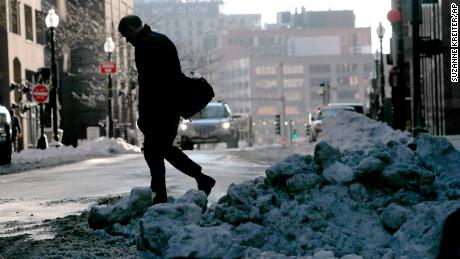Story highlights
- Freezing temperatures are particularly dangerous for the homeless
- Resources are available to help those who have nowhere to go
(CNN)As temperatures drop across the country, many of us bundle up or simply choose to stay inside to avoid the freezing cold. However, for the nation's homeless staying indoors and warm is not always an option.
Particularly cold weather is dangerous for everyone and spending extended time in the cold can lead to frostbite, hypothermia, and in extreme situations, even death. The National Weather Service warns that temperatures even as high as 60 degrees Fahrenheit can be lethal, especially if the individual isn't properly dressed.
The U.S. Centers for Disease Control and Prevention reports that, on average, at least 1,000 people die each year from hypothermia.
Homeless populations are particularly vulnerable since they have significantly fewer places to take refuge from the weather and less ways to protect themselves outside.
"Anything under 40 degrees Fahrenheit is considered cold," Kevin Hall, Program Director for the Salvation Army in Atlanta told CNN.
"On the norm, we check the weather around 4pm and if it's going to be cold we let people in our shelters know to be prepared."
Ways to help homeless people as the mercury drops:
About 60 cities, including New York, Chicago, Boston, Washington DC, and Baltimore, maintain a 311 number that allows you to report a person that needs help on the street and connect you to homeless outreach teams.
Another good number to know is 211 -- a shortcut that will help connect about 90% of the US population with their local, essential community services.
If the homeless person is a veteran, the VA also has support services available specifically for former service members.
Other cities also have city-specific hotlines to call but, if you're in doubt, you can always call your local police precinct.
If you would like to donate supplies, cold weather items are especially useful this time of year.
"Coats are good -- not everyone has a coat when they come [to a shelter]," explained Hall.
"Also, blankets are really useful."
Miniature hygiene items like toothpaste, shampoo, and body wash are also good items to donate. However, Hall notes to stay away from the full-sized bottles.
"The single woman and single male want to carry little as possible. That's why we ask for miniaturized items."
Ultimately, as temperatures plummet, it's important to get people to shelters or at least connect them with resources to help.
"No matter who you are, you're a human being and we'll try and accommodate you," Hall said.







